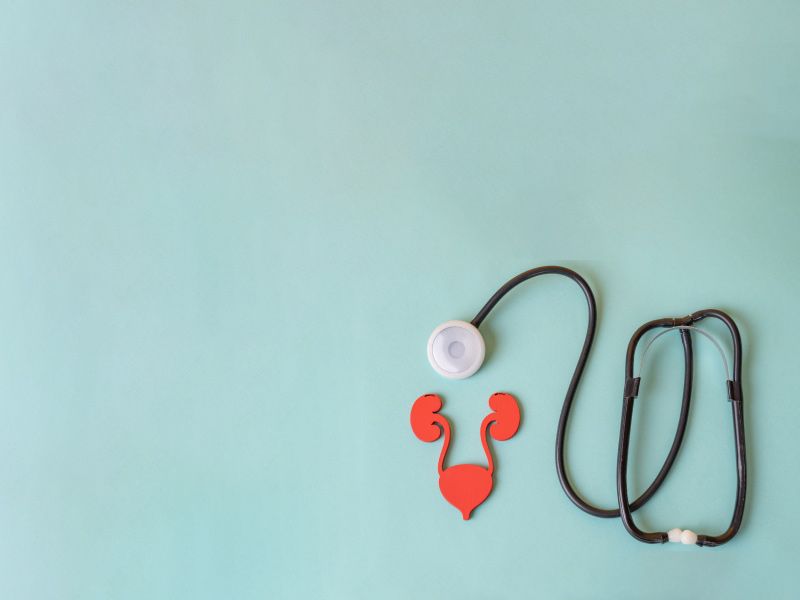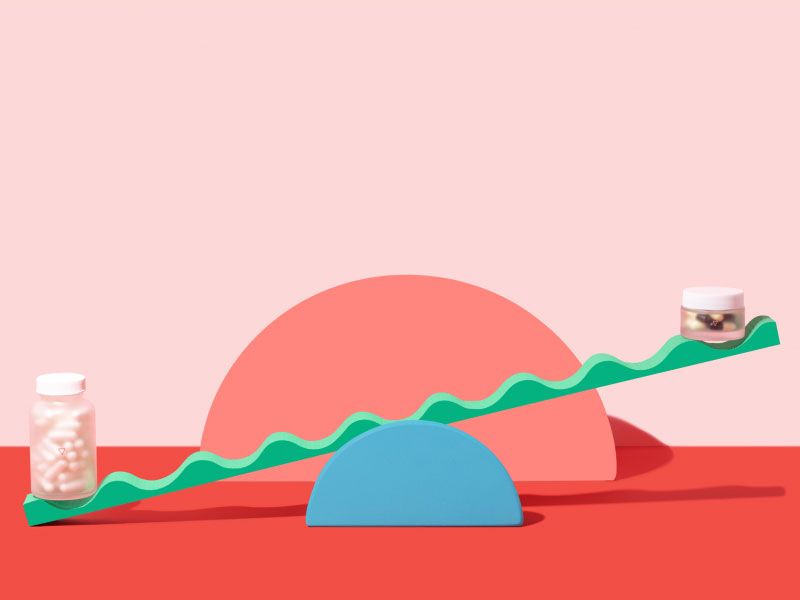
Recognizing UTI Symptoms
in Women
Published on November 1, 2023
Updated on January 5, 2026
Written by Kathleen Morrison
Medically Reviewed by Andrea Sleeth WHNP-BC, MSCP
Key takeaways
- UTIs are common, especially for people with vaginas, and often start with burning, urgency, or cloudy-smelling urine.
- Early recognition and treatment with antibiotics can prevent complications and get you back to feeling like yourself.
- Risk factors include anatomy, sexual activity, certain birth control methods, hormonal changes, and disrupted gut or urinary bacteria.
- Simple habits—hydration, gentle hygiene, peeing after sex, and breathable clothing—can help reduce your risk.
- Hormonal therapy can be a more long-term help for perimenopausal and menopausal women who are struggling with constant UTIs driven by hormonal fluctuations.
- If symptoms worsen or include fever, back pain, or vomiting, seek care promptly—kidney infections require immediate attention.
UTIs (urinary tract infections) are incredibly common—and while they can be uncomfortable, they’re also completely treatable when caught early. If you're noticing symptoms like a frequent urge to pee, burning or pain during urination, or cloudy, strong-smelling urine, your body is telling you something's up. The sooner you look into prescription UTI treatment, like antibiotics for UTI and urinary tract health support, the sooner you can return to feeling like yourself.
UTIs are more common for people with vaginas due to anatomy (hello, shorter urethra), which gives bacteria a quicker path to the bladder. But here's the good news: being in tune with your body and recognizing these signs early means you’re already taking charge of your health.
Left untreated, a UTI can lead to more serious complications, so don’t wait to reach out for support if something feels off.
What is a Urinary Tract Infection (UTI)?
Let’s get real: UTIs are something many people will experience at least once in their lives—and for some, they might come back more than once. The good news? Recognizing the early signs and taking quick action can make all the difference.
UTIs often start with minor symptoms, but if left untreated, they can cause discomfort, disrupt your daily life, and lead to more serious complications. Knowing how bacteria enter the urinary tract and cause irritation is key to taking charge of your sexual health.
Here’s the breakdown: a urinary tract infection happens when bacteria travel up the urethra and into the bladder. Once there, the bacteria multiply, causing irritation and swelling in the bladder lining. That’s when those telltale symptoms—like pain or burning when you pee—tend to show up.
While anyone can get a UTI, people with vaginas are more prone because of their anatomy. Factors like limited access to restrooms or not having accurate information about supporting urinary tract health can make UTIs even more frustrating to deal with.
Common symptoms of a UTI
If you’ve ever felt a painful, burning sensation when you pee, you know it’s no fun. That’s often the first and most noticeable sign of a UTI—and it can make every bathroom trip feel like a struggle.
Other symptoms include needing to pee way more often than usual, which can disrupt your day, from work to social plans. Some people also notice cloudy or foul-smelling urine, which happens when bacteria multiply and interact with your body’s natural fluids. If you spot blood in your urine, it may look pink or reddish. Pelvic pressure or discomfort in your lower abdomen is another common part of the UTI experience.
Symptoms like these can be sneaky and easy to brush off, but your body’s trying to tell you something important. Don’t ignore it—if something feels off, it’s always worth checking in with a healthcare provider.
More severe UTI symptoms
If a UTI goes untreated, it can spread to the kidneys and bring along more intense symptoms, like back or side pain, fever, chills, or even vomiting. These are clear signs that the infection has become more serious and needs immediate attention.
A kidney infection, also called pyelonephritis, happens when bacteria travel even further into your urinary tract. It can make you feel unwell, fatigued, and just plain miserable. Because kidney infections can escalate quickly, it’s essential to seek care as soon as you notice these symptoms.
If your symptoms aren’t improving—or if you’re experiencing new ones like fever or increased pain—it might be time to adjust your treatment plan. Getting the right care is the quickest way to get back to feeling like yourself.
Causes of UTIs
Let’s face it—UTIs can happen to anyone, and there are a lot of factors that might increase your risk. The good news? Understanding what causes them means you can take steps to lower your chances of getting one.
UTIs usually happen when bacteria enter the urinary tract, but the specifics can vary from person to person. While genetics and anatomy play a role, everyday habits like staying hydrated, practicing good hygiene, and paying attention to your body can make a big difference.
Bacterial causes
Most UTIs start with a common bacteria called Escherichia coli (E. coli). It’s typically found in your intestines (where it’s totally normal), but it becomes a problem when it travels to the urinary opening and enters the urethra.
This often happens due to bathroom habits, like wiping from back to front, which can accidentally move bacteria into the wrong areas. Once the E. coli bacteria makes its way in, it can stick to the walls of your urethra, multiply, and kick off an infection.
Although E. coli is the most common culprit, it’s not the only one. Other bacteria—like Staphylococcus saprophyticus or Klebsiella pneumoniae—can also cause UTIs in some cases.
If you’re dealing with frequent infections, a simple urine culture can identify the bacteria causing the problem. This helps your healthcare provider recommend the right treatment to clear things up fast so you can get back to feeling good.
Sexual activity
Let’s talk about sex—and UTIs. Sexual activity can increase your risk of infection because the movement can push bacteria closer to your urethra. But don’t worry—there are easy ways to reduce this risk while keeping your sex life stress-free.
One simple but effective tip? Pee after sex. It helps flush out any unwanted bacteria that might have been introduced. Staying hydrated is another good habit to encourage frequent trips to the bathroom, giving your body extra support in keeping things clean.
Antibiotics
Can antibiotics cause a UTI? Not exactly. Antibiotics don’t directly give you a urinary tract infection, but they can increase your risk indirectly. Here’s the deal: antibiotics can knock out both the “bad” and the “good” bacteria in your body. When the balance of bacteria in your gut or genital area gets disrupted, it creates an opening for harmful bacteria—like E. coli—to make themselves at home in your urinary tract.
So, while antibiotics are great when you need them, it’s smart to be mindful afterward. Drinking plenty of water, practicing good hygiene, and monitoring your body for early UTI symptoms can help you stay ahead of things. If you notice burning, urgency, or unusual discharge, reach out to a healthcare provider promptly—early treatment makes all the difference.
What else to watch out for
Hormones also play a big role in your overall health—and your risk of UTIs. Here’s how:
- Pregnancy: For pregnant women, your growing uterus can make it harder for your bladder to fully empty. This creates a cozy environment for bacterial growth, making infections more likely to occur.
- Menopause: After menopause, lower estrogen levels can reduce the number of good bacteria that naturally protect against UTIs, leaving you more vulnerable.
- Birth control: Certain methods, like spermicides or diaphragms, can upset the natural bacterial balance in your genital area, making it easier for harmful bacteria to take hold.
Lucky for us, small changes can go a long way. Practice good bathroom habits, gently clean your genital area with mild, natural products, and drink plenty of water (at least six to eight glasses a day) to stay hydrated.
If you’re concerned about your birth control or hormonal health, chat with a healthcare provider—they can help you find solutions to lower your risk and support your overall health.
Diagnosing UTIs
UTIs happen—but diagnosing them doesn’t have to be complicated or intimidating. Knowing the signs and getting tested early means starting treatment fast and avoiding things worsening.
Getting an accurate diagnosis is simple. Whether you connect with a healthcare provider in person or online, there are straightforward tests that can quickly identify the issue.
Medical tests
Diagnosing a UTI usually starts with a urinalysis (aka peeing in a cup). A lab will check your sample for signs of infection, like white blood cells or nitrites.
If anything is flagged, your provider might recommend a urine culture. This urine test identifies the exact bacteria causing the infection so you can get the right antibiotics for faster relief.
In more complex cases—like if you have severe back pain, a high fever, or recurrent infections—your provider might suggest imaging tests like an ultrasound or CT scan. These can help spot issues like blockages, kidney stones, or other underlying problems that might be contributing to the infection.
No matter the test, the goal is to get you answers quickly so you can start feeling better ASAP.
Spotting the signs
While only a formal diagnosis can confirm a UTI, paying attention to how your body feels is a great first step. Here’s what to watch for:
- Frequent bathroom trips: If you’re running to the restroom constantly but only peeing a little, it could be a sign something’s up.
- Discomfort: Cramping in your lower abdomen or a burning sensation when you pee might signal an infection.
- Changes in urine: Cloudy pee, a strong smell, or a strange color? That’s worth noting.
- Low-grade fever: Though not always present, a mild fever can sometimes indicate a UTI.
If you notice these symptoms, don’t ignore them. Keeping a quick log of your symptoms (even just in your phone’s notes app) can help your healthcare provider understand what’s going on and recommend the best treatment.
Can You Test for a UTI at Home?
At-home UTI test strips are an easy way to test for a UTI at home. The test strips can help detect markers such as leukocytes and nitrites in urine, which may indicate a urinary tract infection.
These tests provide quick insights and can help monitor symptoms, but they’re not a substitute for a professional diagnosis. If the results are positive or your symptoms persist, it’s still important to consult a healthcare provider for confirmation and appropriate treatment.
Management and Treatment
Whether your UTI is a quick fix or a little more stubborn, the goal is always the same: help you feel better and stay in control of your health.
Fortunately, Wisp makes it easy to access the care you need—quickly and discreetly. Here’s what to expect and how to get back to feeling your best.
Antibiotic treatments
When it comes to UTIs, antibiotics are the usual MVP. Your healthcare provider will recommend a specific type based on the bacteria causing the infection and local resistance patterns. Common options include nitrofurantoin, trimethoprim-sulfamethoxazole, fosfomycin, and cephalexin.
For mild infections, a course of prescription antibiotics might do the trick. If your UTI is more persistent or keeps coming back, your provider may suggest a longer or more targeted treatment plan. Whatever the case, completing the full course of antibiotics is key—even if you’re feeling better before it’s finished. Stopping early can leave some bacteria behind, which might lead to recurrent UTIs.
For those dealing with frequent UTIs or antibiotic resistance, don’t worry—your provider can tailor a stronger, more specific treatment plan to get things back on track.
Wisp treatment options are available only after consultation with a licensed medical professional. You should consult with your healthcare provider before starting a new supplement or treatment regimen. Individual results may vary.
Extra comfort measures
While antibiotics work their magic, you can take a few extra steps to feel more comfortable and ease any annoying symptoms:
- Hydrate, hydrate, hydrate: Drinking plenty of water helps flush out bacteria and keeps you feeling better.
- Apply heat: A heating pad can soothe abdominal discomfort and help with cramping.
- Avoid bladder irritants: Things like caffeine, alcohol, and spicy foods can make symptoms worse—try to steer clear while you’re recovering.
Keeping UTIs at bay
Dealing with chronic UTIs can feel like an exhausting cycle—both physically and emotionally. But here’s the good news: adopting a few simple, everyday habits can go a long way toward lowering your risk of future infections. These small steps create an environment that’s less inviting to bacteria, giving you more comfort and peace of mind.
Daily habits
1. Hydration is your BFF
Staying hydrated is one of the easiest, most effective ways to help you lower the possibility of urinary tract infections. Drinking plenty of water helps flush your urinary system, making it harder for bacteria to stick around. Bonus: it’s super simple to fit into your routine.
Listen to your body when it’s time for a bathroom break—don’t hold it in! Waiting too long can give bacteria more time to multiply, so aim to go as soon as you feel the urge.
2. Keep hygiene simple and gentle
When it comes to hygiene, less is more. Use mild, unscented products to clean your genital area—they’re kinder to your body and help maintain the natural balance of good bacteria.
Wiping front to back is another small but mighty step that helps keep bacteria away. And after sex? Pee as soon as possible to flush out any potential invaders. It’s quick, easy, and super effective.
3. Smart clothing choices
Breathable, cotton underwear? A total game-changer. Tight, synthetic fabrics trap moisture, and bacteria love that. Opting for looser, natural fabrics helps keep things cool and dry.
Also, be mindful of how you wash your undies—use a mild detergent to reduce irritation and keep your skin happy. Comfort is key!
Nutrition tips
Your diet can also play a role in lowering the chances of UTIs. Some foods and drinks can irritate your bladder, making infections more likely. If you notice that spicy foods, coffee, or alcohol trigger symptoms, try cutting back to see if it helps.
Eating a balanced diet filled with fruits, vegetables, and lean proteins can boost your immune system, making it easier for your body to fight off infections. Probiotic-rich foods like yogurt or kefir are also great for supporting healthy gut bacteria that can help keep harmful microbes in check.
And let’s talk sugar—bacteria thrive on it. Cranberry juice is often recommended as a quick UTI fix, but keep in mind that the science isn’t clear on how helpful it really is, plus, most brands add loads of sugar to their drinks. Reducing your sugar intake and reaching for water or herbal tea instead could help create a healthier environment for your bladder.
Not today, UTI
UTIs don’t have to be a constant source of stress in your life. When you know what to look for (and how to handle it), you can stop them and get back to feeling like yourself.
Taking a proactive approach is key because no one wants a UTI to get worse or spread. With a little knowledge and some easy habits, you can reduce the disruptions from frequent bathroom trips or that painful burning sensation.
At Wisp, we’re all about empowering you with convenient, accessible care that helps you take control of your health—without the hassle of in-person visits. With discreet, judgment-free services, we’re here to make sure you have the resources you need when you need them.
This blog post is for informational and educational purposes only and should not be taken as professional advice. Always consult with a qualified professional before making any decisions based on the information provided here.




